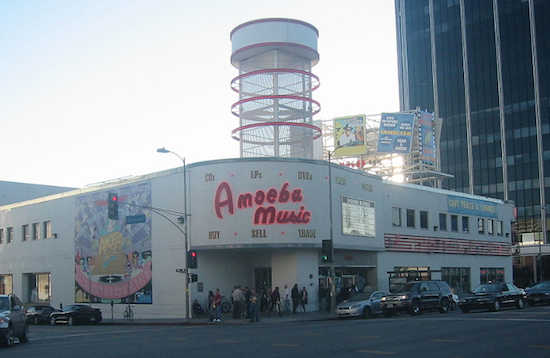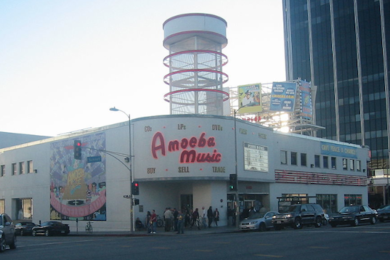Last month, Amoeba Music, the Californian independent music store giant, announced a new project as part of its website revamp. Vinyl Vaults sees Amoeba digitising their extensive stocks of rare and out-of-print vinyl, ranging from Lead Belly and Thelonius Monk to co-owner Marc Weinstein’s personal Sun Ra collection, which are then available for purchase as mp3, m4a or WAV files.
On the face of it, it’s a good idea, making music that might have otherwise lingered unplayed in the back room widely available and preserving it in a lossless format. As Amoeba say: "Vinyl is the ultimate expression of an artist’s work, and we’re doing our best to preserve our history!"
However, the store’s approach to the rights and profits of the Vinyl Vaults material is a more knotty issue. For the most part, Amoeba have been able to establish the rights-owners of the music; however, for those they couldn’t find, any profits from sales have been put into an escrow account, which the rights-owners can access if they approach the store.
Speaking to Variety magazine, Amoeba co-owner Jim Henderson explained the process further: "We couldn’t find C.J. [70s country singer Curt Johnson]; we couldn’t find a label that put the record out. But it’s a compelling piece, (so) we said, ‘This should be up.’ […] If (someone says), ‘That’s mine,’ well, OK, we can either take it down or we’ll sell it, and you’ve got this nice (digital) master. We’ll sell it, we’ll promote it; let’s sign a contract." In essence, a fairly loose attitude to both copyright and profits.
Shortly after the news was announced, the Quietus was contacted by an independent record label insider, who put forward a number of concerns about Amoeba’s project: "For the few surviving labels like us, who spend months, even years, tracking down and socialising with the original artists, it resembles a kick in the teeth and, if they get away with it, an almost penultimate death blow."
They added: "Amoeba is one of the biggest stores in the world, with an unfathomable influx of (copyright protected!!!) music coming through their racks… this abusive kid-in-a-candy store/mine-sweeping mentality is basically akin to mass looting! Heaven help any small label or stand-alone artist who rightfully had a precious plan in process for re-presenting their own music.
Continuing, our source pointed out that making profits available in an escrow account as payment presumes that the original artist and label concerned are initially aware of Amoeba: "What about the huge, huge, huge majority of elderly or dead artists, who are quietly naive to Amoeba’s egotistical operation?
"In simple terms, an ‘obscure record’ is invariably a ‘rare and out-of-print record’… it’s rare for a reason, because the artist had bad luck first time round… so why would you kick them again 30 years down the line?"
Through putting in place the escrow system, it appears as though Amoeba have sought to establish themselves as the de-facto owners of the music. By doing so, they ignore the well-established process of re-releasing music that a host of dedicated reissue imprints have been practising for years, and are also taking profit from the sales, payment that gets shared only when and – perhaps more crucially – if the actual owners come forward.
"Much as I love Amoeba, I think this is a bit odd," says Jonny Trunk, owner of Trunk Records, a long-running reissue label. "I have looked at their Vinyl Vaults section, specifically in the area I specialise in – film music, TV music, library music, electronics – and many of the albums they have for download are easily licensed. This is done by phoning up the libraries and doing a simple licensing deal. All theses libraries are still operating and easily found and contacted (e.g. Selected Sound, De Wolfe, Kpm). Some of what they have up for sale digitally should not be there, unless they have a license, but what they have up for sale (that I can see on a quick scan) is so random that it looks like it has not been licensed at all.
"I think if the albums they have for sale digitally are genuinely impossible to trace (in terms of ownership) then I see no problem with this – in fact it has been standard practise for a few years if the original artists of an obscure/private album have disappeared off the face of the earth. But to have library music up there as downloads without licensing it is not right. And it’s very easy to license these days.
The impossibility Amoeba cite in tracing the albums’ copyright owners is in itself questionable. As has been pointed out on the Very Good Plus message board, the album My Lady’s Eyes by C.J. that Henderson name checks is on the Ovation label, as demonstrated by the third result on a Google search. Our insider also added that they have had first-hand experience in this regard: "A track from our own catalogue actually appeared on the website two weeks ago, without anybody contacting me or the artist. My label is not at all difficult to find, which proved that their ‘best efforts’ to contact the rights holders are less than adequate. The track has since been removed!"
Trunk continues: "I like the idea behind this Vaults concept, especially with 78rpm recordings, period rarities and out-of-copyright material. Most albums and artists from the late 1960s onwards, however obscure, are traceable these days, or you can certainly get near. If they start out with this slightly cavalier attitude (e.g. releasing De Wolfe material for download without a license for example), they are going to have to deal with a whole load of legal crap coming at them from all over the place, and a whole lot of dedicated reissue labels who spend months and years sometimes finding lost artists are really going to get pissed off."
As Trunk points out, Amoeba look to have crossed both ethical and legal boundaries. While the escrow account element would seem to be a pre-emptive attempt to overcome any problems with regards to ownership, does this actually hold any legal weight?
"Not really," says Jeffery Daar, principal at the Daar & Newman law firm in Los Angeles, who specialises in intellectual property and entertainment law. "Unfortunately, even well-intended efforts in the United States to make available out-of-print music are fraught with risk. While holding in trust the proceeds from downloads may be a legitimate solution, the commercial use of the tracks without the permission of the rights holder(s) would seem to be technical infringement. While it may not be willful infringement, the risk is serious. Amoeba’s use of an orphaned work without permission runs the risk that the copyright owner(s) may bring an infringement lawsuit for substantial damages, attorney’s fees, and/or injunctive relief."
Looking at the project as a whole, Daar explains that Amoeba may have left themselves open to legal challenges: "While I applaud the spirit of the Vinyl Vaults project, the copyright laws of the United States are a significant obstacle to any such effort. Unfortunately for Amoeba and music fans, U.S. copyright laws governing music are antiquated. Basically, unless a music composition was published before 1923, most compositions remain under copyright until 2019 or later. Much of the types of work in the Vinyl Vaults project will likely be protected until 2067. Accordingly, any project such as Vinyl Vaults must give serious consideration to avoiding copyright infringement claims made by copyright owner(s).
Daar adds that the rare nature of the music in Vinyl Vaults provides no defence legally. "The United States copyright laws do not contemplate or provide an exemption for out of print music compositions. In addition, there is no legal excuse for infringement even if it is done in good faith and the money from the infringement is held in trust. Accordingly, unless Amoeba has the express permission of the correct copyright owner(s) it runs the risk of being liable for copyright infringement," he says.
"U.S. law is far from clear on how to deal with orphaned works, which is music where there is no clear knowledge of ownership. With the Vinyl Vaults project, Amoeba is charging for each download of its digitised and remastered tracks. Amoeba may be acting above board in its claims that it first seeks to track down and obtain the permission of rights holders (assuming who owns the rights is going to be clear) and then hold in trust the money paid for downloads for those it cannot find. However, it would appear that for such tracks, Amoeba may be found guilty of infringement if a copyright owner came forward and brought a copyright infringement lawsuit."
It should be added that, in almost all respects, Amoeba do an excellent job: they are the largest independent record store in the world, with three huge premises in Los Angeles, San Francisco and Berkeley, which not only do a strong line in in-store performances, but harbour acres of expertly-stocked record racks. Both our insider and Trunk prefaced their answers by making clear their love for the company, while Daar writes: "As an avid purchaser of both new and old music based in Los Angeles, I must first note that Amoeba Music is an amazing place and one of the last surviving places in California to buy music. The store in Hollywood has to be seen to be believed, since it is an entire city block."
Additionally, Trunk adds: "The other side of the coin is to remember that rare and obscure music has been appearing illegally on blogs, etc, for years now – Amoeba’s project may well be a way to create a fund for these forgotten artists, and it’s highly unlikely that any of these really obscure albums will generate anything financially significant. My one experience of putting out an LP with no label owners (I licensed it from the artists’ widow) ended up with the label owners’ son eventually finding me one year later, being thrilled at the LP existing and wanting all proceeds given to charity."
This should hopefully be the case, with Vinyl Vaults giving some high-profile visibility and profit to long-lost music. However, it remains that Amoeba’s initial approach reflects a more worrisome mindset. The release of music without license from the copyright owners could present the store with a series of legal difficulties, which their practice of laissez-faire salesmanship may render tricky to negotiate. Moreover, the Vinyl Vaults project sidesteps many of the basic principles of reissuing music, putting profits ahead of ethics – and in the process risks consigning some labels, whose tireless work has resulted in the records that fill their shelves, to a vault of a different kind altogether.
Amoeba were given ample opportunity to respond but declined



